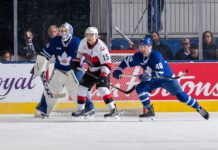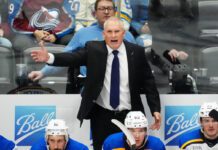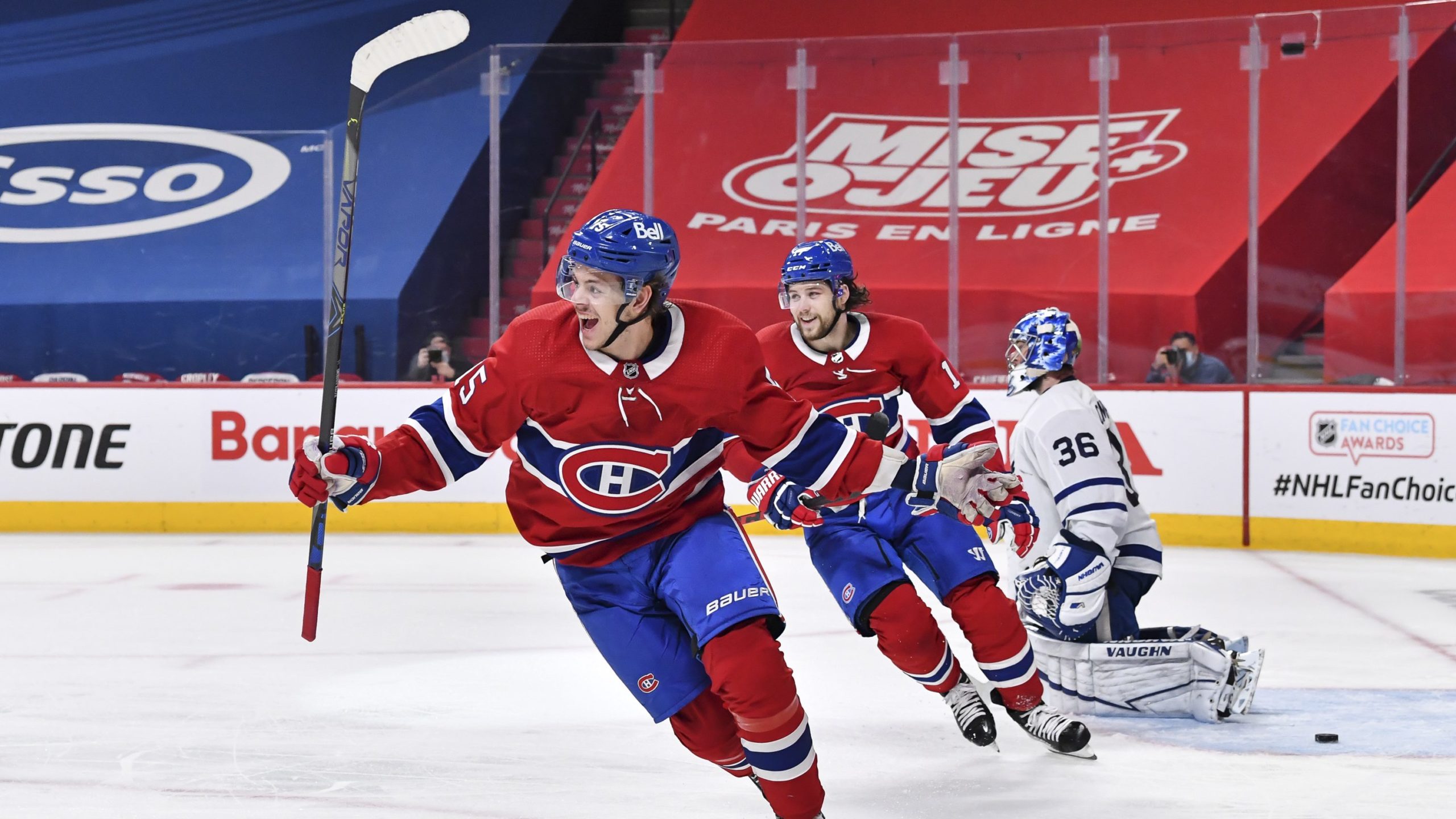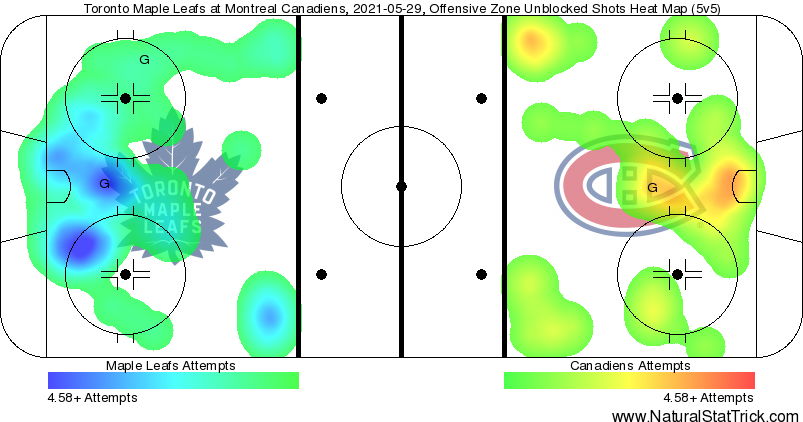The Leafs deserved to lose tonight.
Yes, they made a nice comeback. Yes, they absolutely outplayed the Habs in overtime. But the first two periods were arguably their worst two of the season.
At times, it was honestly surreal to watch. I was speechless. I’m sure many of you were as well. There really wasn’t much to say. The Habs just kept coming at them. The Leafs had no answers.
Jack Campbell was excellent and kept them alive, setting the table for a late comeback. But it was too little, too late.
This is the second game in a row that the Habs jumped out to a lead, the Leafs battled back, and the Habs won in overtime. It’s great that they have the ability to battle back into games, but you have to start the games ready to go.
Now we head into a Game 7 where anything can happen. To say that there’s a lot on the line is underselling it. This group simply can’t afford to lose in the first round again for the fifth straight time. Even with the John Tavares injury this year, and the Jake Muzzin one last year, it really doesn’t matter. They need their young stars to pull through at some point — in particular, Auston Matthews and Mitch Marner. It should be noted that William Nylander has been legitimately good in this playoff.
Writing about what is at stake on Monday could literally be an essay at this point. I won’t do it. Simply put: Just win, baby. Doesn’t matter how.
In the meantime, your game in 10:
1. All things considered, I have zero reservations in saying that was the worst start to a game for the Leafs this season. Montreal generated five high-danger attempts and 11 shots on net roughly halfway through the first period. Jack Campbell stopped Tyler Toffoli on a breakaway. The Leafs had a power play and the Habs created the best chance on it.
Two things stood out – the Leafs couldn’t handle the Habs’ aggressive forecheck, and they couldn’t sustain any zone time to settle down the pressure. Aggressive forechecks can get you sometimes — it’s simply inevitable — but when you’re getting pressured, you need a pushback shift.
The Leafs got nothing pretty well line after line to start the night. They were even gifted a penalty on a clumsy play by Josh Anderson in the Leafs’ own end, but they generated very little.
2. The saving grace was Jack Campbell, who was dialed in and excellent in the first period. He was about the only reason it was a tie game after one. While on one hand it was disappointing to see that kind of start from the team, on the other, it’s a saving grace to have a goalie keep the team in the game. If you’re the Habs, you’ve played that well, generally carried the play, and you have essentially nothing to show for it after one period of action.
That helps the coaching staff going back into the room. They have to calm the team down and get them to reset. Their team isn’t even chasing the game. To their credit, the Leafs did look better at the start of the second period — even drawing a penalty to start — but again, their power play let them down.
The power play is getting into the, “the other team is tilting the ice following Leafs’ power plays,” territory. They registered zero shots on net in their first two power plays. The level of ineptitude is beyond belief.
3. From there, the Habs started to carry play again. Eric Staal and Phillip Danault both had prime chances. Caufield hit the post. After two periods, the Habs nearly doubled the Leafs in shot attempts. The Leafs weren’t sustaining any pressure (although they did create a few chances here and there), and they generally looked a step slow. They were losing battles regularly.
In the last two games, the Habs have been a lot more aggressive forechecking and pressuring the Leafs’ defensemen instead of trying to hang back and slow the game down. They also looked to work the points and get their defensemen involved – they had 21 shots on goal through two periods, and a third of them were from defensemen.
Create turnovers, throw pucks to the net, get it to the point, generate traffic, win battles, and keep possession down low. Through two periods, the scoring chances were 21-6.
4. I thought the decision to demote Alex Kerfoot and move a clearly-still-injured Nick Foligno right to the second line was particularly curious. Since Game 1, Kerfoot has been excellent. I don’t think anyone would disagree that he has been one of their best players in this series. Kerfoot and Nylander using their speed together has been a handful for Montreal to handle, and yet they were broken up for no apparent reason.
If John Tavares was to return and the coaching staff was going to put him back in the 2C spot, that would be understandable. Foligno isn’t Tavares, though, and under ideal circumstances, I’m not even entirely sure he’s a center at all. These were less than ideal circumstances — he is not moving around well at all, clearly hampered by a lingering injury.
5. Travis Dermott committed the giveaway on the winner, but he was really solid until then. He played more minutes than expected due to the Jake Muzzin injury, as did Zach Bogosian, who played over 20 minutes for the first time this season and was steady throughout the night (even if the overtime winner did go in off of him). Morgan Rielly played nearly 35 minutes on the night, TJ Brodie played over 31, and that pairing generally stayed together while others rotated around.
The obvious answer is inserting Rasmus Sandin should Muzzin miss out on Game 7, but I think Ben Hutton is at least conversation-worthy as the safer, higher-floor type of choice. He also offers them a penalty-killing option if Muzzin is out.
6. Any sort of lengthy Jake Muzzin injury is obviously extremely concerning. We noted his sneaky level of production after Game 5 (he leads all Leafs defensemen in even-strength scoring the past two seasons), but it’s the tough minutes he plays leading the Leafs’ shutdown pairing that would be the hardest to replace.
Of all the injuries that are possible on defense, his absence would be the most difficult for the Leafs to fill. In this game, there was no real way to get an indication of how they plan to move forward – there were a number of penalties in the third period, and the Leafs were chasing the game.
On the 5v3 kill, Muzzin’s absence hurt. On the Toffoli goal, TJ Brodie was outside of the faceoff dots pressuring the puck handler in the corner. There’s just no point in doing that. It’s a 5v3.
7. Dominique Ducharme has the worst challenge I’ve seen in the history of the league from earlier in the series, but I don’t think the Sheldon Keefe challenge had much of a case, either. Jake Campbell didn’t make much of an effort to get up or get back in the net. He likely wouldn’t have got it anyway, but without any real physical impediment, I’m not sure how the officials could call that back, or why Keefe would challenge it.
It made things worse, obviously, with the ensuing penalty. While killing that penalty, Mitch Marner shot it over the glass for no apparent reason. I’m not sure what else to say. It was a pivotal moment for the team in a high-pressure situation, and he kind of folded.
It’s a completely unforced error, and while sitting in the box, Marner showed his emotions. To his credit, there’s a good chance he saved the game for them in overtime with a diving play on defense on a down low 2v1.
8. For years, we’ve talked about the need for depth scoring in the playoffs and how it hurt this team in close games. You have to give Jason Spezza a huge shout-out — he just continues to find ways to score in limited minutes.
Spezza is second on the team in goals so far these playoffs. In the third period, after Keefe put together a line of Zach Hyman – Alex Kerfoot – Jason Spezza, they created a number of chances.
The curious part is the lack of overall ice time Spezza continues to receive. Joe Thornton played more than him tonight. Only Thornton, Adam Brooks, and Riley Nash have averaged less time on ice than Spezza in these playoffs so far. He doesn’t play on the top power-play unit, and yet only a few players have produced more.
The fact that Spezza played under two minutes on the power play tonight while Thornton played over five is honestly stunning. That is the exact type of coaching decision that will come under heavy, heavy scrutiny should the Leafs ultimately lose this series — and it has been happening all year.
9. I think Zach Hyman deserves a ton of credit on the tying goal. It was the end of his shift, he had three Habs on him, and he could have easily dumped the puck in and got off. It was definitely the safe thing to do. Down a goal, he held on instead and tried to make a play along the wall, retaining possession during the change. When it was loose, he kept battling while surrounded by Habs, leading to a loose puck. You know the rest.
Pierre Engvall won a race, found TJ Brodie, and then, of all people, who was driving the net while the puck went in? Hyman. He is clearly not in form since the knee injury, but he’s trying to battle through it. He came up with a huge play there.
10. After a bit of a shaky first shift to start overtime, the Leafs really carried the play and pushed for the game/series winner. They put the first eight shots on goal in overtime and there were a few reasonable scoring chances in there, including an Alex Kerfoot shot in the slot and an Auston Matthews rebound attempt.
I thought it was interesting that Sheldon Keefe reverted back to the lines he went with to start the game as opposed to keeping the lines together that helped the team tie the game in the third. Why mess with a good thing?
While the Leafs did generate a ton, ultimately, it was a turnover and deflection that ended it for the Habs. What makes it especially tough is that the Habs rolled four defensemen on the night and they were visibly gassed. The Leafs them on the ropes — until it was suddenly game over.



































![New Leaf Anthony Stolarz on the opportunity in Toronto: “In Florida, I knew my role as a backup… Now, [Joseph Woll] and I are competing for starts… As a goalie, that’s all you can ask for” Anthony Stolarz, Stanley Cup win, now Maple Leaf](https://mapleleafshotstove.com/wp-content/uploads/2024/07/anthony-stolarz-sc-100x70.jpg)
